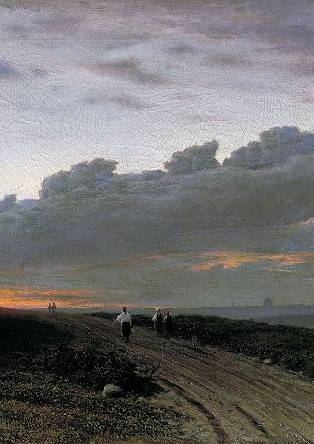Outwardly, Tiutchev's (Tyutchev's) was one of the most unpoetic of lives. He was born into the ancient nobility, educated at the University of Moscow, and entered the diplomatic service, remaining abroad in Europe for the following 22 years. He married a Bavarian member of the aristocracy and regarded Munich as his true home. He corresponded with Heine and Schilling, sent some verse to Pushkin's Sovreménnik over the 1836-38 period, where they were published over the signature of 'F.T.' but attracted no attention. Tiutchev lost his first wife but married a second time, again to a Bavarian, and was posted to Turin, which he detested. Without permission he left his post of chargé d'affaires, and was expelled from the diplomatic service, settling as a private citizen in Munich. In 1844 he returned to Russia and there obtained a post in the Censorship. In 1854 his poetry first appeared in book form, but Tyutchev was now a pugnacious and hardened reactionary: the poems were strongly nationalistic and Slavophile, making 'painful reading' for liberal opinion. In 1873 he died, after a stroke that left only his brain operational. {2-3}

Tyútchev was rediscovered by Nekrásov, and remains celebrated for the intense love poetry that has a passion and poignancy like nothing else in Russian. They were written for Mlle Denísieva, his daughter's governess, with whom he had an affair that tainted his reputation but wholly ruined hers.
When, in 1864, Mlle
Denísieva died, Tyútchev was plunged into grief and despair, his guilt
only sharpened by the forebearance shown by his wife and the
brilliant figure he still cut in society as Russia's greatest wit and
conversationalist.
Tiutchev's poetry seems
insubstantial, hardly worth the writing down: {1}
Федор Тютчев «Осенний вечер»
Есть в светлости осенних вечеров
Умильная, таинственная прелесть!..
Зловещий блеск и пестрота дерев,
Багряных листьев томный, легкий шелест,
Туманная и тихая лазурь
Над грустно-сиротеющей землею
И, как предчувствие сходящих бурь,
Порывистый, холодный ветр порою,
Ущерб, изнеможенье — и на всем
Та кроткая улыбка увяданья,
Что в существе разумном мы зовем
Божественной стыдливостью страданья!
Есть в свет лос ти осен них ве че ров 5a
У миль на я, та инст вен на я пре лесть!..5B
Зло ве щий блеск и пест ро та де рев, 5a
Баг ря ных листь ев том ный, лег кий ше лест, 5B
Ту ман на я и ти ха я ла зурь 5c
Над груст но-си ро те ю щей зем ле ю 5D
И, как пред чувст ви е
схо дя щих бурь, 5c
По ры вис тый, хо лод ный ветр по ро ю, 5D
У щерб, из не мо жень е — и на
всем
5e
Та крот ка я у лыб ка у вя да нья, 5F
Что в су щест ве ра зум ном мы зо вем 5e
Бо жест вен ной стыд ли вость ю стра дань я!.. 5F
A TTS (text to speech) recording is:
Tiutchev's poems are the more remarkable in that he used
Russian infrequently: his wives did not speak Russian, and Tyutchev's
everyday speech and correspondence was in French. {2-3}
Tiutchev is now regarded as the true descendent of Pushkin: the little
poems sent to Sovreménnik are known by heart across Russia and the love
poems speak with an anguished directness that no one will envy. All the
poetry, except some the savage invective of the
political pieces, which sometimes rise into true eloquence, is
pantheistic, profoundly pessimistic and dualistic, indeed Manichaen.
The Cosmos around us is always at the mercy of Chaos. Our existence
here is fleeting and precarious. Tyútchev's Russian is a little more archaic than Pushkin's, and he has
none of the great poet's range, but the romantic style marries vivid
imagery with classical order. {2-6}
For more biographical details, and the philosophical setting,
please see my free Tyutchev Poems ebook.
We have to convey Tiutchev's restraint and musicality, perhaps as something like this:
Autumn Evening
What lordly airs the autumn evening has;
what charms are here, mysterious and sweet.
The trees in brilliant reds are various
as leaves fall soft, unthreatening at our feet.
A blue that’s lightly touched with fog now forms
above this sadly-orphaned forest spot:
a premonition too of coming storms,
of cold and gusty winds, as like as not.
Exhaustion, injury, a going hence,
from everything a smile that’s fading out:
and some intelligence around we sense
as modesty in suffering, and devout.
References can now be found in a free pdf compilation of
Ocaso Press's Russian pages.
Russian poem translations on this site: listing.